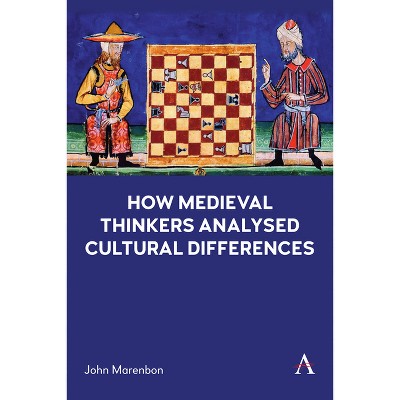$24.90 sale price when purchased online
$24.95 list price
Target Online store #3991
About this item
Highlights
- What is culture?
- About the Author: Sondra L. Hausner is Professor of Anthropology of Religion at the University of Oxford.
- 92 Pages
- Social Science, Anthropology
- Series Name: Anthem Impact
Description
About the Book
This volume considers the meaning of culture and anthropology's role in defining it. Taking up the history of the discipline and the method of ethnography in turn, the book asks if the concept of culture might be productively reclaimed within a context that acknowledges history, change, and diversity.Book Synopsis
What is culture? The history of our discipline - whether we call it ethnology or social anthropology - shows that there is not a constant answer to this question or even a constant object of study. How can we search for a unifying answer to what makes us human even as we observe how immensely varied we are? And how can we explain that such difference is the very core of what makes us similarly human? This book explores the idea of ethnography as a method for understanding cultural flow in particular contexts and suggests that anthropology can do its most important work by tracing the history of social formations. Nothing about culture is static, yet something best-called culture sustains itself over time. At the heart of anthropology is the attempt to understand the concept of culture, even as we continue to challenge its definition in our field. This short volume presents the Jensen Memorial Lectures delivered at the Frobenius Institute for Research in Cultural Anthropology at Goethe University, Frankfurt, in 2019. The lectures reflect on the current moment in - and the capacity of - contemporary anthropology to consider the discipline's basic premises, through the lens of its classical thinkers. Through a set of four lectures and an introduction, this book takes up anthropology's most basic question - the meaning of culture - and asks how it is that our unique method is able to elicit both fine-grained particularities about specific social orders and speak to the definition of that which makes us human.Review Quotes
"A compelling read and deft exploration of anthropology's core contributions via a series of encounters with its ancestors. Sophisticated and subtle, the argument is thoroughly persuasive--we should reclaim anthropology's tools, and indeed, today need them more than ever. To read is to rekindle and recommit!" -- Julie Hemment, Professor & Chair, Department of Anthropology, UMass Amherst
"This is a very welcome and insightful attempt to restart a conversation that was central to anthropology not so very long ago." -- Michael Lambek, University of Toronto
"A Genealogy of Method gets readers to think deeply about the approaches to cross-cultural comparison that became influential in German and Anglophone anthropologies and the reasons why they formed into distinct traditions --or, at times, managed to mutually shape each other. This highly accessible book highlights in particular the dialogues between anthropology, comparative religion, philology, and history from the nineteenth century to the 1970s." -- Dr. Katherine Swancutt, Reader in Social Anthropology, King's College London
"This is a bold book, daring to revive but also to reconsider the culture concept within anthropology. Moving with great clarity across American, British, French and German intellectual debates, Hausner provides a powerful response to two questions of central importance to the discipline: do we need to reconceptualize our notion of culture; and if so, how? The result is a work that is historically informed yet utterly timely." -- Simon Coleman, Chancellor Jackman Professor, University of Toronto
About the Author
Sondra L. Hausner is Professor of Anthropology of Religion at the University of Oxford.Dimensions (Overall): 9.0 Inches (H) x 6.0 Inches (W) x .22 Inches (D)
Weight: .32 Pounds
Suggested Age: 22 Years and Up
Series Title: Anthem Impact
Sub-Genre: Anthropology
Genre: Social Science
Number of Pages: 92
Publisher: Anthem Press
Theme: Cultural & Social
Format: Paperback
Author: Sondra L Hausner
Language: English
Street Date: July 16, 2024
TCIN: 93387935
UPC: 9781839986482
Item Number (DPCI): 247-44-0694
Origin: Made in the USA or Imported
Shipping details
Estimated ship dimensions: 0.22 inches length x 6 inches width x 9 inches height
Estimated ship weight: 0.32 pounds
We regret that this item cannot be shipped to PO Boxes.
This item cannot be shipped to the following locations: American Samoa (see also separate entry under AS), Guam (see also separate entry under GU), Northern Mariana Islands, Puerto Rico (see also separate entry under PR), United States Minor Outlying Islands, Virgin Islands, U.S., APO/FPO
Return details
This item can be returned to any Target store or Target.com.
This item must be returned within 90 days of the date it was purchased in store, shipped, delivered by a Shipt shopper, or made ready for pickup.
See the return policy for complete information.












